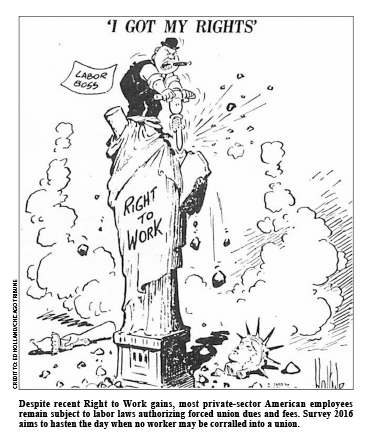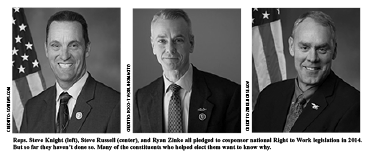Is This Any Way to Run a City’s Schools?
Leaked CTU Proposals Won’t Do Anything to Improve Schools’ Poor Performance
Federal Politicians Hear From Their Freedom-Loving Constituents
(download the June-July 2016 NRTWC Newsletter)
Nearly seven-and-a-half years into the Administration of union-label Democrat President Barack Obama, National Right to Work Committee members and other citizens who oppose forced unionism deserve commendation for what they have accomplished in a very challenging political climate.
In January 2009, when Mr. Obama took up residence in the White House, 22 states had Right to Work laws on the books prohibiting the termination of employees for refusal to join or pay dues or fees to an unwanted union. And 40% of Americans lived in Right to Work states.
As Mr. Obama’s second presidential term draws to a close, 26 states — including Midwestern and manufacturing-dense Indiana, Michigan and Wisconsin — are Right to Work. And nearly 49% of Americans reside in such states.
Soon Right to Work Backers May Once Again Have to Defend Their Ground
“The addition of four new Right to Work laws over the past four years is unparalleled since the 1950’s, and the 2.8 million Committee members and supporters’ persistent and principled advocacy has contributed greatly to the movement’s recent success,” said Committee President Mark Mix.
“But we can’t let our happiness about the direction state labor policy has been heading make us complacent.
“The fact is, despite the ample progress the Committee and our allies have made in building support for the Right to Work in Congress as well as in state legislatures since 2010, we could potentially face a terrible setback in the courts in the near future.
“In the wake of the death of President Reagan-appointed U.S. Supreme Court Justice Antonin Scalia in February, the coalition of High Court members who consistently side with Big Labor on controversial matters may soon rise to five out of nine.
“Meanwhile, a pending Big Labor lawsuit against Idaho’s three-decade-old Right to Work law, known as International Union of Operating Engineers Local 370 v. Wasden, has the potential to become a ‘doomsday’ weapon against all state bans on compulsory union dues and fees.
“One way a future Big Labor-controlled High Court might use Wasden to gut all 26 state Right to Work laws is by ‘reinterpreting’ Section 14(b) of the federal Taft-Hartley Act.
“In this federal case, a team of ‘go-to’ union lawyers led by Harvard professor Ben Sachs are contending that 14(b) authorizes states to prohibit the firing of employees for refusal to become full-fledged union members, but not to bar forcing such employees to pay union ‘agency’ fees as a job condition.”
Congressional Reaffirmation Of 14(b)’s Meaning Could Prove to Be Necessary
Fortunately, Congress undeniably has the power to correct the Supreme Court when it comes to statutory interpretation.
But that can only happen if majorities in both chambers of Congress, or perhaps even supermajorities, are willing to acknowledge that Taft-Hartley Senate sponsor Robert Taft (R-Ohio) was right when he said that 14(b) recognizes states’ prerogative to “make all forms of compulsory unionism . . . illegal.”
To ensure that the 26 Right to Work states will be able to continue protecting employees from forced union membership, dues and fees, and additional states will be able to offer the same protections to employees in the future, the Committee is now conducting its federal Survey 2016 program.
As many Committee members know, the federal survey asks candidates to commit themselves to oppose forced unionism and support national Right to Work legislation if they are elected.
Moreover, current members of Congress are asked to demonstrate they mean what they say on their Right to Work surveys by cosponsoring H.R.612 or S.391. These are the federal forced-dues repeal measures now before the House and Senate.
Reps. Knight, Russell And Zinke Represent Strongly Pro-Right to Work Constituents
Mr. Mix observed: “The vast majority of the incumbent House members who pledged in response to the Committee Survey 2014 to cosponsor national Right to Work legislation have now signed on to H.R.612.
“But a relative handful of congressmen who answered their surveys 100% in support of Right to Work, such as Reps. Steve Knight [R-Calif.], Steve Russell [R-Okla.], and Ryan Zinke [R-Mont.], have yet to keep their word by cosponsoring forced-dues repeal.”
This summer, the Committee will be mobilizing members and supporters in a number of targeted congressional districts and states to convince fence-sitting politicians to cosponsor H.R.612 or its Senate companion measure.
 Later this year, the Committee mobilization will be geared primarily at persuading Big Labor politicians to change course and stop supporting compulsory unionism.
Later this year, the Committee mobilization will be geared primarily at persuading Big Labor politicians to change course and stop supporting compulsory unionism.
Throughout the course of the Survey 2016, candidates will be given several chances to return their surveys and answer 100% in favor of American employees’ Right to Work.
This year, as in previous federal election years, millions of grass-roots Right to Work supporters are being enlisted to lobby candidates to respond to their member surveys.
“Steve Knight, Steve Russell, Ryan Zinke, and several other U.S. representatives who are currently being targeted through the survey program hail from some of the most strongly pro-Right to Work jurisdictions in America,” noted Mr. Mix.
“There’s no sensible reason why congressmen whose constituencies are so overwhelmingly and passionately opposed to monopolistic unionism would hesitate to cosponsor H.R.612.”
All major-party candidates as well as key significant third-party and independent candidates in every House and Senate race are asked to participate in the Right to Work survey program.
And pro-Right to Work citizens in every House district and every state where there’s a Senate race are contacted and requested to help turn up the pressure on their candidates to respond to their surveys.
Ideal Is For All Candidates to Oppose Forced Unionism
“Of course,” said Mr. Mix, “the Committee reserves the vast majority of its survey resources and mobilizes far more freedom-loving activists for House and Senate races that are at least potentially close and in which at least one candidate has taken a strong stand in favor of Right to Work.
“The ideal for Right to Work leaders and members alike is for all the general-election candidates in a race to vow to oppose forced unionism.”
But at the very least Right to Work supporters want one major-party candidate in each close race this November to be a credible opponent of Big Labor’s monopoly privileges.
“In cases where only one of the two principal general-election candidates stands up for the Right to Work,” said Mr. Mix, “the Committee’s job this fall will be to let freedom-loving people know about the contrasting positions of their candidates on the Right to Work issue.
`“I’m confident that, if there is a choice between a strongly pro-Right to Work candidate and a union-boss candidate, the pro-Right to Work candidate is in a better position to prevail come Election Day.”

Leaked CTU Proposals Won’t Do Anything to Improve Schools’ Poor Performance

Wherever Big Labor wields the power to collect forced union dues, union bosses funnel a large share of the confiscated money into efforts to elect and reelect business-bashing politicians. Employment growth tends to lag as a consequence.

Members Insist They Keep Pro-Right to Work Campaign Promises